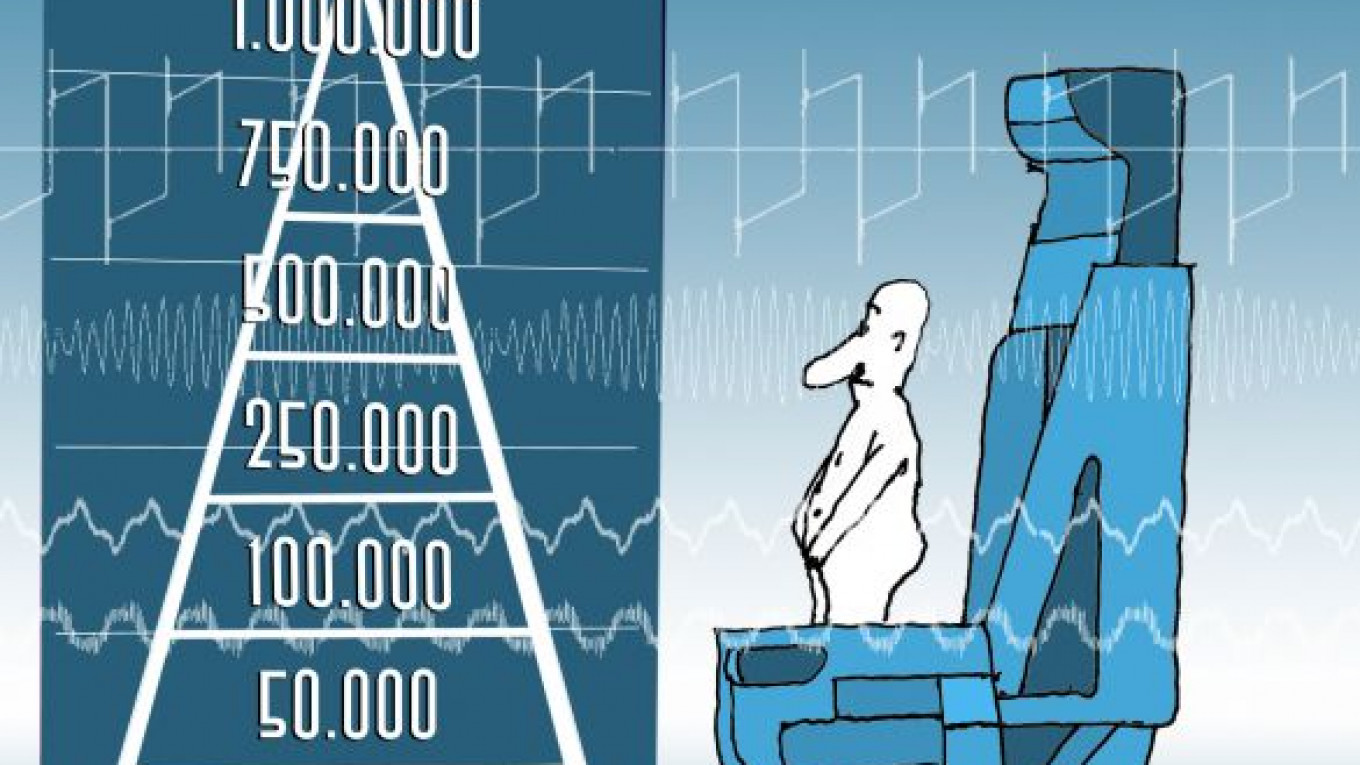This week, Channel One started a new game show called “Lie Detector,” where contestants have to truthfully answer questions to win a cash prize of one million rubles ($33,086).
The first contestants should really have been the members of the U.S. spy ring, whom I imagine were submitted to similar tests by the secret services when they returned to Moscow. That would have been a ratings winner. But they were apparently too busy singing songs around the campfire with Prime Minister Vladimir Putin.
Instead, the first show featured a middle-aged nanny and a 23-year-old businessman, who were grilled about their love lives in a way that made viewing uncomfortable.
The show is hosted by Andrei Malakhov — whose delivery is so insincere that you want to strap him to a lie detector — and is billed as a “psychological project.” It’s based on a show from the United States, “The Moment of Truth.”
The idea is that participants initially answer questions while wired to a lie detector — although this is not shown onscreen. Then in the studio, they have to answer the same questions with their nearest and dearest watching. If they give answers exposed earlier as lies, then they immediately lose all the money.
It’s a strange format because viewers don’t see the lie detector results. In the first episode, the contestants gamely gave away secrets about family feuds and infidelities, only to walk away without a ruble because they were deemed to have lied about their feelings.
The show has provoked some predictable outrage.
Commentators on Channel One’s web site called the show “revolting” and “amoral.”
A headline in the Komsomolskaya Pravda tabloid asked, “Is this a new level of freedom on our TV or the degradation of society?”
“Maybe it will now become the norm to go up to someone on the street and ask them whether they had sex on Thursday,” the newspaper warned.
The first contestant on Saturday, Yelena, a nanny, had her husband and mother in the studio as she answered questions that focused on her husband’s straying.
Question five was: “Do you think you’re wise because you are able to ignore your husband’s infidelities?” Yelena answered yes, adding, “Forgive me, Sasha,” as her husband of 25 years looked on.
She then said yes to a question about whether she had ever wanted to cheat as revenge. That answer took her up to 50,000 rubles. “That’s not bad money for a teacher in a Russian school,” Malakhov said.
Another question was, “Do you remember what day you last had sex?”
Yelena’s mother commented, “For 100,000 rubles you could remember,” but she said no, an answer that came up as true.
She finally came unstuck after an innocuous question about whether she thought her salary was decent. She said yes, arguing that she recently got a raise, but the machine said no.
The next contestant, Alexei, 23, had his mother, aunt and girlfriend in tow. He had a clear-eyed guileless way to him and admitted to group sex, smoking weed and disliking his mother’s new husband.
“Go on Lyosha, tell it like it is,” his girlfriend, Valentina, egged him on, calling him her “best friend.”
But she had a nasty shock when he was asked whether he had not married Valentina yet because he was not 100 percent sure about her. He answered no, but the machine said he lied. The camera zoomed in on Valentina’s face as her smile disappeared and a tear fell from her eye.
“Maybe you should check your feelings and understand why you aren’t ready,” Malakhov empathized smarmily. “For some girls, a stamp in the passport is more important than flowers and presents.”
A Message from The Moscow Times:
Dear readers,
We are facing unprecedented challenges. Russia's Prosecutor General's Office has designated The Moscow Times as an "undesirable" organization, criminalizing our work and putting our staff at risk of prosecution. This follows our earlier unjust labeling as a "foreign agent."
These actions are direct attempts to silence independent journalism in Russia. The authorities claim our work "discredits the decisions of the Russian leadership." We see things differently: we strive to provide accurate, unbiased reporting on Russia.
We, the journalists of The Moscow Times, refuse to be silenced. But to continue our work, we need your help.
Your support, no matter how small, makes a world of difference. If you can, please support us monthly starting from just $2. It's quick to set up, and every contribution makes a significant impact.
By supporting The Moscow Times, you're defending open, independent journalism in the face of repression. Thank you for standing with us.
Remind me later.






